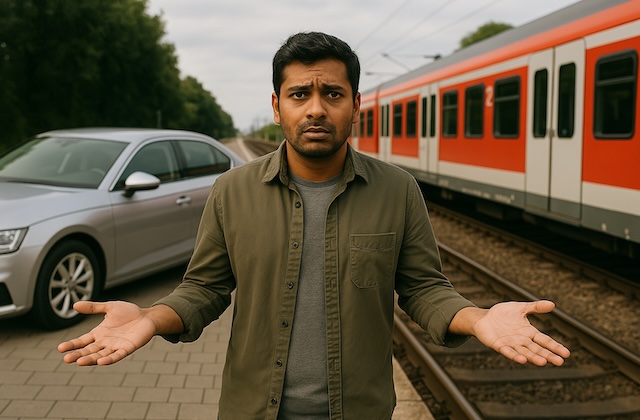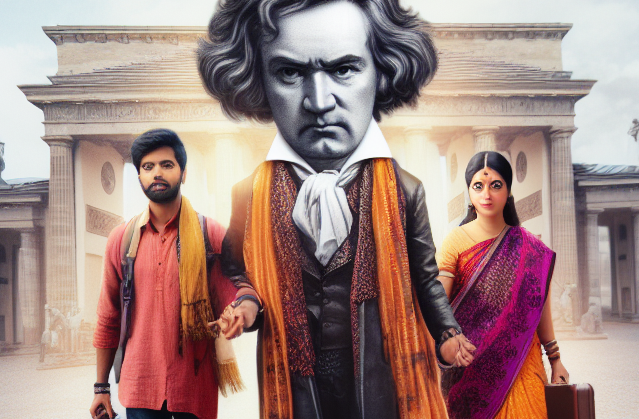
I grew up in India where cars were everyday essentials and status symbols. My family always had one. Driving was instinct more than rules. Roads were chaotic, and traffic laws felt like polite suggestions. You learned to drive by reading the flow, not a manual.
Moving to Germany flipped that. Not having a car felt odd, even limiting. Friends back home asked when I’d get one. I had no good answer. Owning a car back home was a rite of passage. Germany made me rethink what freedom really means.
Why a Car Isn’t Always Freedom in Germany
Germany’s roads run on order, not chaos. Licenses aren’t handed out like candy. The system demands strict rules and punishes mistakes. Public transport isn’t a backup plan — it’s the main way people get around.
I started questioning if I really needed a car. Buying one does not costs a fortune but keeps draining money—insurance, fuel, repairs, taxes, parking. Parking in cities? A nightmare and bit expensive compared to India. Owning a car felt more like paying a pricey membership fee to a frustrating club.
Back in India, I had the motivation to upgrade from a Honda to a BMW or Mercedes. Here, that urge just fizzled out. I could have bought a luxury car easily, but the idea didn’t appeal. The hassle, the costs, the endless upkeep — it all felt pointless. It was a different game.
I chose to live without one. It wasn’t easy, but it made more sense.
The Public Transport Advantage (Even If It Runs Late)
Germany’s public transport isn’t perfect. Trains get delayed. Services sometimes falter. But it’s reliable enough to avoid traffic jams and hunting for parking.
I mix trains, trams, bikes, and ride-hailing apps like Uber, Bolt, and Free Now. They cover late nights or unreachable spots. Yes, ride-hailing can get pricey, but it beats car ownership.
You need patience and planning. Apps mostly run in German or English, which helps. Over time, you learn schedules, routes, transfers. It’s better to work with the system than try to force your way.
The German Driving License Challenge for Indians
If you’re Indian, getting a German license can be a headache. Our driving style, shaped by chaotic traffic, clashes with German precision and strict rules. You face lessons, theory exams in German, and plenty of waiting. The process drags for months and costs a small fortune.
That was a major barrier for me. I had to ask if I wanted or needed the license. The answer was clear. The time, money, and effort weren’t worth it.
When Not Having a Car Hurts
The worst moments come when someone’s ill and you don’t have a car. Waiting for a taxi during emergencies is frustrating and scary. I won’t sugarcoat it. I’ve wished for my own car to rush to the hospital.
So I keep emergency numbers handy. I stock basic medicines at home. I learned to ask for help instead of trying to do it all alone. Community matters when you live car-free.
Unexpected Perks of Living Car-Free
Living without a car made me walk and cycle more. My health improved. I started noticing my surroundings instead of tuning out behind a wheel. You meet people. See life happen. It teaches patience and planning.
Owning a car changes your mindset. It locks you into routines and makes you less flexible. Without one, you plan smarter and find alternative routes or transport you never considered.
Cultural Shift: From Indian Car Norms to German Realities
In India, a car is often a necessity and a status symbol. Here, many see cars as a burden or luxury you can skip. Changing that mindset is tough. It means shedding old ideas about success and mobility.
Germany’s environmental push nudges things further. Cities encourage cycling, walking, public transport. Fewer cars mean less pollution and better living for everyone.
Practical Tips for Indians Living Car-Free in Germany
Learn the transport apps: Deutsche Bahn, BVG, MVV, and others make travel easier. Plan ahead, know schedules and ticket zones. Keep ride-hailing apps ready for late nights or emergencies. Build a local network—neighbors or friends with cars you can call. Stock basic meds and first-aid supplies. Use a bike for short trips—it beats public transport delays. And accept that delays happen. It’s part of the deal.
Living car-free in Germany demands adjustment and planning. It takes sacrifice, too. But it offers a different kind of freedom—less financial stress, better health, more awareness of your surroundings.
If you’re an Indian moving here, don’t rush into buying a car or chasing a license. Explore the transport system first. You might find you’re better off without one.
Sometimes, not owning something is the smartest move you make.
If you are interested in my other blogs, do check them out here.
Get Deep Views in Your Inbox!
Twice a month, I share stories and insights about product management, parenting abroad, and building a meaningful life — no spam, just real stuff.
Do not forget to write a comment below after reading. Its free!
Disclaimer: The information presented in this post is provided for general informational purposes only. The author makes no representations or warranties of any kind, express or implied, about the accuracy, completeness, reliability, suitability, or availability of the information. Any reliance you place on such information is strictly at your own risk.
The author does not endorse or take responsibility for the content, products, services, or any other material mentioned in this post. The inclusion of links or references to third-party websites does not imply endorsement or guarantee their accuracy.
Readers are advised to independently verify and fact-check information presented in this news post before making any decisions or taking any actions based on the content. The author shall not be liable for any errors or omissions in this information nor for the availability of this information. The author will not be liable for any losses, injuries, or damages from the display or use of this information.

